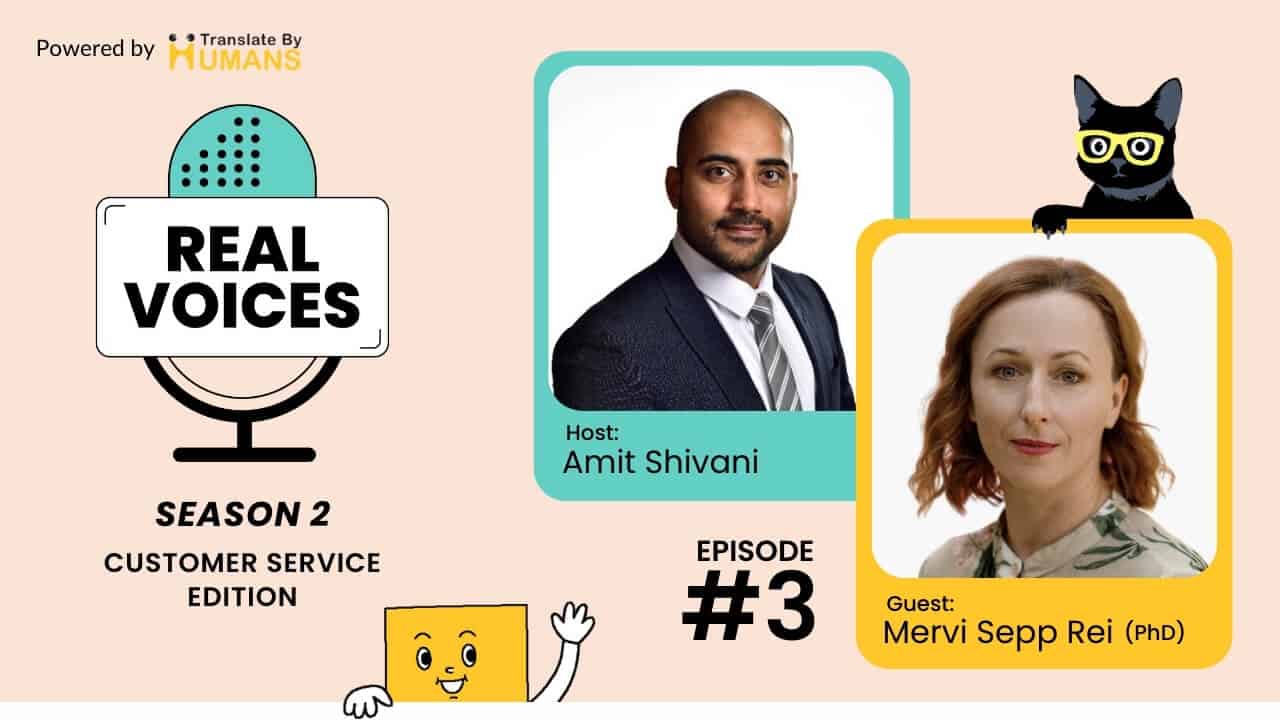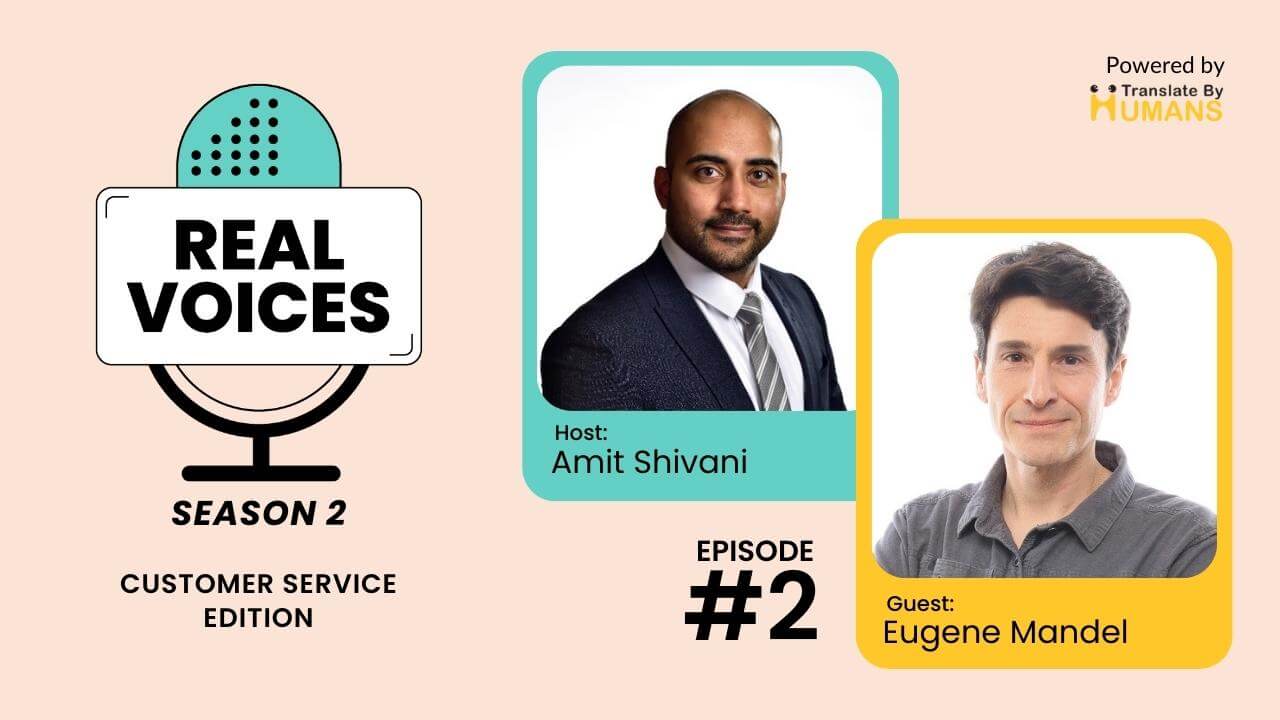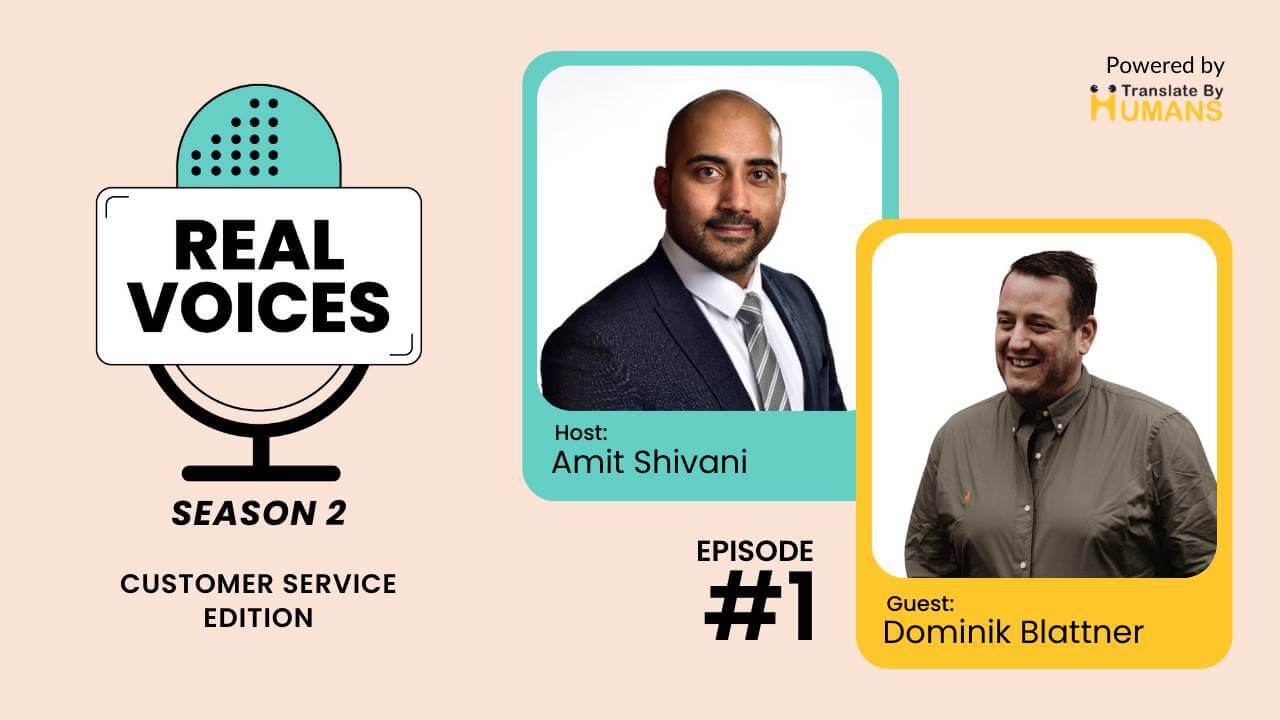Home » Real Voices » Data Empowerment: Revolutionizing Customer Service with Kaizo | A Podcast with Dominik Blattner
Data Empowerment: Revolutionizing Customer Service with Kaizo | A Podcast with Dominik Blattner
Listen on :
Our Guest

Dominik Blattner
Founder, Kaizo
Our Host

Amit Shivani
Director of Sales, Lingpad
Welcome, listeners, to our stimulating episode of “Real Voices – Customer Service Season 2.” Today, we have a remarkable guest with us, Dominik Blattner, the founder of Kaizo, an innovative app changing the game in customer support.
Join us to discover the world of Kaizo with our host – Amit Shivani, Director of Sales at Translate By Humans as we uncover the secrets to making data accessible and actionable for everyone, regardless of their background.
Key Takeaways:
- Dominik's Background: Personal insights
- Kaizo's Different Approach: Non-data audience
- Effective Use of Kaizo: Minimise lagging indicators
- Obstacles in Implementation: Shifting mindset
- Impact of Gamification: Healthy competition benefits
- CSAT Customisation: Adaptable across industries
- Kaizo Implementation: Plug-and-play, training
- Kaizo Success Story: Transformative impact
Key Insights:
Could you please begin by introducing yourself, giving us insight into your personal background and experiences? Afterwards, we'd love to hear about Kaizo and what it represents.
Hey there, I’m on a journey from my background to the vibrant city of Amsterdam. My career began as a consultant in the business process field, leveraging my skills in mathematics and computer science. My specialty? Making complex math relatable to people who do the real work, not just crunching numbers and KPIs all day.
Then, I took a leap into the world of entrepreneurship, and now I’m on my second venture with Kaizo. Kaizo is all about boosting workforce engagement. What’s that mean? Well, we provide operational managers and their amazing customer support teams with everything they need. It’s not just about performance and quality – it’s also about motivation, coaching, and improvement. Right now, our platform works seamlessly with Zendesk, and we’re gearing up to launch on Salesforce. Exciting times ahead!
Perfect. Thank you for that introduction.
In this podcast, we’re tackling a vital challenge: making data accessible to everyone, regardless of their familiarity with it. Whether you’re a seasoned professional or just starting out, whether you’re at the top of the corporate ladder or an entry-level employee, we all encounter data in various forms. The catch is, we often struggle to understand it, misinterpret it, or see it as just a bunch of numbers. But in the world of Customer Service, these numbers can make or break your revenue and customer satisfaction.
So, the problem statement that we are going to discuss is how it is different in the sense of presenting this data to people who are non-data audiences.
At Kaizo, our approach is all about shifting from measuring success through lagging indicators, which are results-driven and often not actionable, to focusing on leading indicators. We believe in providing actionable advice and tools to help individuals and teams improve in real-time. This means translating goals into specific actions, like knowing the number of customer contacts needed for a sale or identifying behaviours that enhance customer support. By emphasising leading indicators, we empower people to work towards their goals proactively, ultimately achieving better results. That’s the Kaizo difference – a focus on actionable, leading-driven metrics for operational success.
If I'm just starting my career in this field, let's say I've recently become a team leader (not yet a manager), and I want to implement these actionable strategies. How can I effectively access and utilise Kaizo to achieve the best results, as you mentioned, without relying too heavily on lagging indicators?
When it comes to managing a customer support team, there are two paths to success. First, if you have experience, you can rely on your instincts and knowledge of key metrics like CSAT, grammar, sentiment, and reopening rates. But if you’re new to the role or need more guidance, you have two options. One, you can dive deep into learning about these metrics, using resources like Help Center articles and customer support communities to understand their impact on each other. Then, you can choose a few key indicators to focus on with your team. Second, as your team grows and goals change, you might benefit from automation tools like Kaizo to analyse and manage performance. These tools can help you pinpoint the most important areas to concentrate on for each team member’s success. Ultimately, the choice of which tool to use is critical, and we believe Kaizo is a top contender.
Certainly. When I explored your website and watched some of your videos, I found the gamified approach quite intriguing. It's evident that there's a strong element of gamification, which can be a significant asset for individuals who aren't highly data-driven and prefer a more engaging experience.
Now, as someone aiming to introduce this change in their role as a manager or team leader, or simply trying to shift the mindset towards considering both lagging and leading indicators, what obstacles can I expect to encounter during implementation? And how would you recommend overcoming these challenges?
I think there are so many, but let’s pinpoint maybe one or two of the big ones.
Trust Your Gut: Believe in yourself and your team’s instincts. Your experience counts, and sometimes, your intuition is spot-on. Don’t second-guess it. Trust that your efforts will yield results, even if you need to report to higher-ups.
Embrace Change Dynamically: Things change all the time, and you can’t stick to fixed goals when the world is constantly shifting. Be flexible, adapt to change, and adjust your strategies accordingly. Stubbornness won’t get you far.
Empower Your Team: Treat your team like the capable individuals they are. They can make decisions and take ownership. Provide an experience that lets them shine, not just by the numbers, but by giving them the autonomy to excel.
In short, trust yourself and your team, be flexible in the face of change, and empower your team members to take charge and excel.
That's useful, and that's sensible advice as well, and that's now my next question to you would be competitiveness.
What could be the effects of introducing healthy competition among customer service agents through gamification? How should we address potential challenges or concerns, especially for those who might struggle in such a competitive environment?
Learning from our mistakes is valuable. Initially, we believed competition drove success, but we soon realized it wasn’t the right approach. Customer Support isn’t about competing against each other but supporting one another.
Team competitions are better than individual ones. People thrive when they develop together, not against each other. Traditional rankings, where you rate agents, have drawbacks. They motivate those already at the top but demotivate others stuck at the bottom.
Instead, we found creating team challenges and recognising collective achievements works best. Gamify your approach, and remember, moving up a few spots can be just as rewarding as being number one. Avoid intense competition and focus on collaboration.
You've made a crucial point, and I couldn't agree more. People's opinions may differ when it comes to processes, but in customer service, teamwork is key. When a team is motivated to succeed together, it shows in their performance. Simple things like celebrating birthdays or having team events create that vital cohesion. Sometimes, assembling a team of all-stars doesn't guarantee success because competition among them can hinder teamwork. So, fostering team unity is indeed the way to go.
I’d be thrilled to hear success stories where these rankings have proven effective for more than just a few days. In my personal experience, I’ve mostly encountered recurring issues with them. It seems pretty intuitive, and while some people may like it, I believe that when we hire customer support heroes, we’re looking for individuals with talents related to problem-solving, support, and helping people. It’s not necessarily about competing against each other. Rankings may not be the most suitable tool for addressing these skills and qualities.
Could you explain the level of customization and adaptability that Kaizo offers to cater to the unique processes of different businesses, even though there may be some commonalities across industries?
In the world of customer support, there are common goals like improving CSAT and response times. However, the approach can vary greatly based on your business and customer expectations. For example, in industries like security or law, clients may prefer slower but more thorough responses, while in fast-paced sectors like food delivery, quick solutions are key. Different markets and customer preferences also play a role. So, flexibility in measuring and adjusting performance indicators is crucial, and products like Kaizo can help with that. Ultimately, it’s about tailoring your support to meet your clients’ unique needs, wherever they are.
But that's not gamification. That's not the easy data to understand. And the whole point is, is data for people who don't understand data. The next thing is, these days you know, our CEO call it the Google effect, which is, every time you type something in search, and you hit enter, you get the results straight away. And people are now we are so used to these instant results that we have customers, and people are not so used to waiting.
So, if somebody wants to use Kaizo, or any core business or company wants to use Kaizo, is it a plug-and-play application? How long will it take before it gets implemented? Does it have an implementation time? Do they need special training? How does that work?
It’s like grabbing a ready-made tool, and right now, it’s available for seminars. Sorry about that, but soon it’ll work seamlessly with Salesforce too. Just grab it, give it a spin, and you’ll be up and running in no time. No complex setup needed, just build your team, invite the right folks, and you’re good to go. We even have in-product tutorials if you need them. As you go along, if you want to tweak things, our customer success team is here to help. It’s a plug-and-play solution that’s there when you need it and steps back when you don’t. So, super easy to use!
Perfect, because this was one of the things while we were developing Lingpad as well; it was one of those things that when I try and speak to customers about it, I just say it's like, it's like any of the apps that you download on your phone, you know, you very quickly download any app. And once it's downloaded, you can start using it. That's simply what I say about Lingpad: just click and play. So that's what it is. Okay, I'm sure you probably would have encountered many success stories in your time or with Kaizo.
Could you share a remarkable success story from Kaizo's customer service journey? Something that exemplifies the impact your platform has had on a company or a customer service scenario?
On our website, we showcase some impressive customer success stories, often featuring well-known brands. However, the real magic happens with our smaller clients. These stories are particularly exciting because they reveal how understanding and a change in mindset can lead to remarkable transformations.
Let me share a fascinating example: We had a smaller client struggling with customer support challenges and failed attempts at gamification. KPIs were a headache, and they felt the pressure of change. Interestingly, this client quietly downloaded our product without reaching out for help. We desperately wanted to assist but couldn’t contact them.
Over time, we watched this client’s journey unfold. They began by focusing on seemingly insignificant KPIs, gradually diving into metrics that initially seemed unrelated. Quality assurance scorecards became more sophisticated, and their gamification, coaching, and support strategies evolved. Eventually, we made contact with them, and it was astonishing to hear how they had independently transformed their operations, from a small team of 15 to nearly 60 people. It’s a remarkable success story that showcases the power of starting small and growing with the right tools, like Hazel.
In essence, while we celebrate our larger clients like Footlocker and Molly’s Woman, it’s these smaller success stories that truly capture the essence of change and growth, making our journey all the more amazing.
Sharing a heart-warming story is wonderful. It's so comforting to see small businesses flourish with the help of your solutions. As the founder, it must be incredibly fulfilling knowing you've played a part in their growth, even if they don't express their gratitude directly. Deep down, you know your product and process contributed to their success.
Working in customer support has been an incredible experience. Our clients are not only friendly but also empathetic, making our interactions enjoyable. They often go the extra mile, sometimes even diagnosing issues themselves. It’s a fantastic environment, collaborating with these heroes who express their needs and preferences effectively. Their valuable feedback stems from their own challenging experiences with clients, making this space truly special.
In this engaging podcast, we’ve explored the transformative power of Kaizo, where data meets simplicity and effectiveness. From Dominik’s journey to the exciting realm of gamification, we’ve discovered how Kaizo can revolutionize customer service. It’s a plug-and-play solution that empowers teams to achieve greatness, fosters healthy competition, and adapts to the unique needs of different businesses.
Plus, we’ve been inspired by a heartwarming success story that proves the impact of Kaizo’s approach.
Thank you for joining us on this enlightening journey, and remember, data is for everyone!
Share this video:




